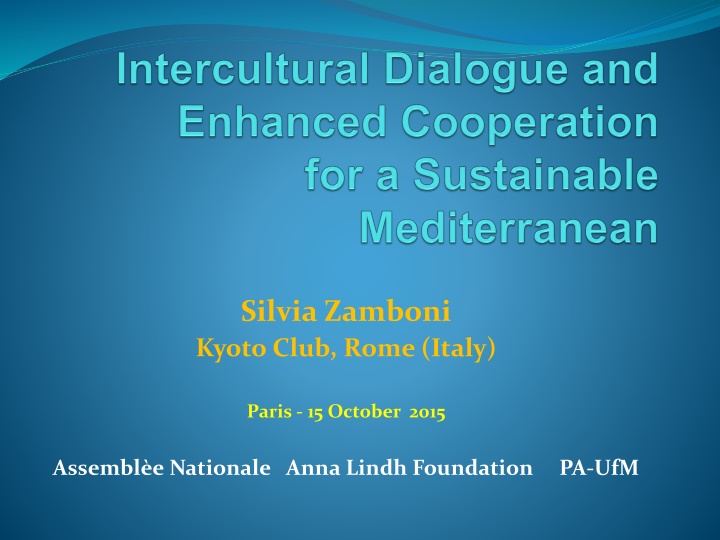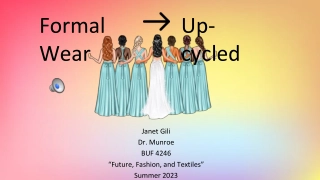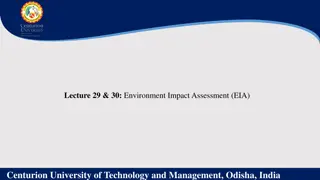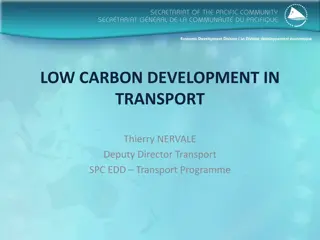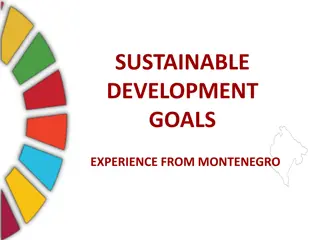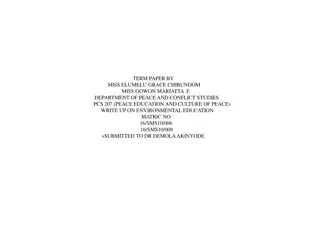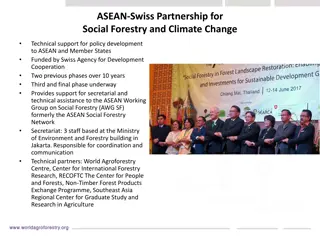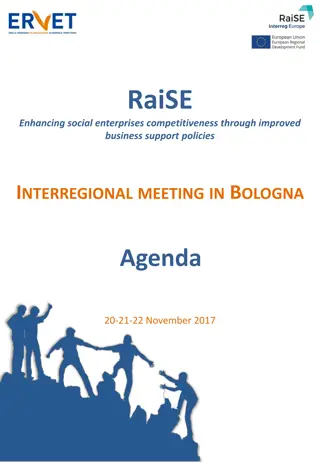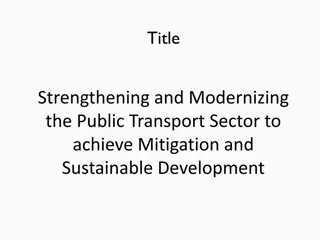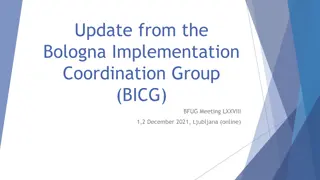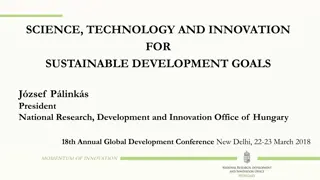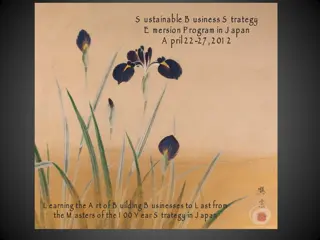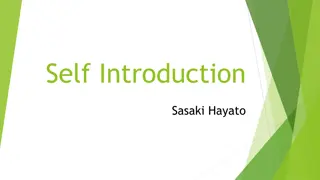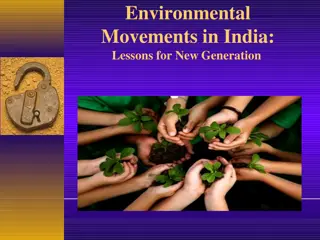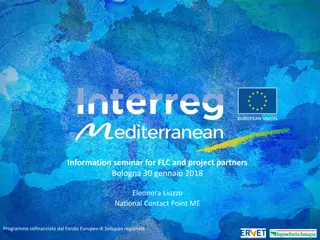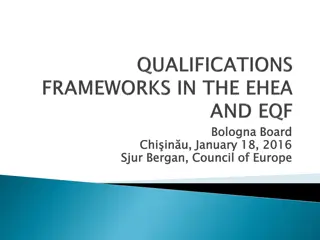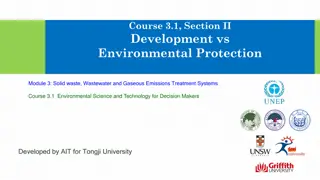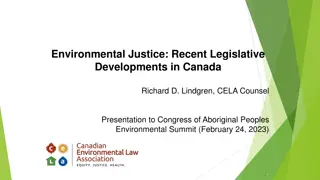Environmental Initiatives by Kyoto Club and Bologna for Sustainable Development
Kyoto Club, an Italian non-profit organization founded in 1999, aims to promote sustainable practices and reduce greenhouse gas emissions. It engages in various activities such as training courses, sustainable agriculture, and waste management. As a partner in projects like ZeroCO2 and Green Partnerships, Kyoto Club collaborates on energy efficiency and renewable energy initiatives in the Mediterranean region. Additionally, Bologna, recognized as a resilient city, implements adaptation measures to combat climate change challenges.
Download Presentation

Please find below an Image/Link to download the presentation.
The content on the website is provided AS IS for your information and personal use only. It may not be sold, licensed, or shared on other websites without obtaining consent from the author.If you encounter any issues during the download, it is possible that the publisher has removed the file from their server.
You are allowed to download the files provided on this website for personal or commercial use, subject to the condition that they are used lawfully. All files are the property of their respective owners.
The content on the website is provided AS IS for your information and personal use only. It may not be sold, licensed, or shared on other websites without obtaining consent from the author.
E N D
Presentation Transcript
Silvia Zamboni Kyoto Club, Rome (Italy) Paris - 15 October 2015 Assembl e Nationale Anna Lindh Foundation PA-UfM
Kyoto Club in Few Words Who - Kyoto Club is an Italian non-profit organisation founded in 1999. Its members are business companies, local authorities, universities and environmental associations committed to reaching the greenhouse gas emission reduction targets set by the Kyoto Protocol and the EU climate change goals. Mission - To increase the environmental culture of business companies and institutions, foster their dialogue, encourage and disseminate best practices, promote sustainable development patterns. Activities - training courses in Italy and abroad sources, sustainable agriculture and foresty, efficient waste management and sustainable mobility. It also organizes campaigns, disseminates best practices and participates in EU funded projects. It promotes awareness-raising and information activities, on energy efficiency, renewable
Kyoto Club as a partner in the Intercultural Dialogue for a Sustainable Mediterranean area ZeroCO2 (2010-2012) - Funded through the MED Programme, the project aimed to develop and implement a partnership model among local authorities, energy agencies and private partners (like ESCOs) for the creation of a sustainable energy action plans with zero CO2 emissions at zero cost forsmall European communities: www.medzeroco2.eu Green partnerships (2013-2015) - Funded through the MED Program 2007-2013; 11 Mediterranean countries as partners; 24 pilot cases of energy efficiency and renewable energy sources, covering areas such as energy renovation of protected cultural objects, the creation of local added value chain to improve energy self-sufficiency and energy efficiency, efficient public lighting, introduction of projects of public-private partnerships as well as innovative approaches to public awareness and citizens participation in planning and implementation. The project details as well as the Final publication and Step by step Guide areavailableon: www.greenpartnerships.eu Wealth: (2013-2015) - Funded through the ENVICBCMED Program, the project challenges the neo-liberal conceptions of wealth based purely on economic richness. By fostering an alternative economic paradigm whereby wealth is defined by the wellbeing of people and the planet, it encourages sustainable growth in the Portugal and the Palestinian Authority). www.ised-wealth.org partnering regions (Israel, Italy, For further information: KyotoClub Director: SergioAndreiss.andreis@kyotoclub.org
Bologna as a resilient city November 1997 (Japan) ICLEI Award Campaign. - on the occasion of the CCP World Summit in Nagoya within the ICLEI Cities for Climate Protection June 2015 within the BLUE AP (Bologna Local Urban Environment Adaptation Plan for a Resilient City) LIFE+ project, presentation of Bologna s Adaptation Plan to Climate Change (first city in Italy), providing for six pilot actions to make the city more resilient and able to meet the climate change challenges (www.blueap.eu). Six pilotactions (defined through a participatory process): 1) inclusion of adaptation measures in the City s Building Code; 2)guidelines for infrastructures at risk; 3) green roofs campaign; 4) improvement of the rainwater harvesting capacity of waterproof areas; 5)collection and filtering of rainwater to be utilized in different ways, from WC drainage to the irrigation of green areas; 6) promotion of insurance schemes, by informing companies and citizens about the opportunities offered though public/private partnerships by insurance policies against extremeclimate events.
Climate Change and Environmental Justice Pope Francis Encyclical on the Environment Laudato si : ecological conversion which affects both individuals - in their consumption patterns - and the international community, which has not acted enough till now due to lack of political will. Rich countries are destroying poor ones while the earth is getting warmer. The warming caused by huge consumption on the part of some rich countries has consequences on the poorest areas of the world, especially Africa, where a rise in temperature, togetherwith drought, has proved to bedevastating for farming . Lord Nicholas Stern (Vatican State, 10 September 2015): challenges: managing climate change and overcoming poverty. If we fail to manage climate change, we will create an environment so hostile that lives and livelihoods will be destroyed. If we try to manage climate change by placing obstacles to overcoming poverty we will not have the coalition we need to manage climate change. If we fail on one we fail on the other. Better growth, betterclimate. The moral arguments are crucial: degrading the environment via climate change or otherwise denies too many, particularly poor people (including those yet to be born) the right to development, the right to work to enhance their living standards. But we can effectively combine rising living standards and the responsible management of climate change. calls for an we face two
Climate Change as an Economic Challenge The costsof notdoing anything againstclimate change are higherthan the required investments (2006 Stern Report). Climatechange ist notonlyanenvironmental problem butundobtly the most importantof all the economic problemswe have to tackle. It is more serious than unemploymentand the monetary crisis (Carlo Carraro, directorof the International Center for Climate Government, Le Monde, 11-12 October 2015)
Climate Change as a Human Health problem The damages from fossil fuels (beyond climate) are immense: impact of urban air pollution on our health (many millions of lives and livelihoods detroyed per year. China air is equivalent to 40 cigarettes/day. Nevertheless the total cost of fossil fuel subsidies (included pollution and climate damages) = 5.3 trillion dollars a year (IMF)
Climate Change as aSecurity and Social Challenge. Environmental Refugees Climate change is an environmental, economic and social issue. Since the UN Security Council in 2007, it has been also identified as a concern for peace and security to be regarded as a threat multiplier while affecting key natural resources such as water, land, coastal areas and exacerbating conflicts. environmentally induced-migration (due to further desertification, sea level rise, more extreme weather events), food scarcity and health diseases related to extreme events are a reality: for instance, the management of the Jordan river basin is posed at risk by the negative effects of climate change on water stocks, while the inhabitants of South Pacific islands have become the first climate refugees. The 2012 report by the Secretary General at the General Assembly of the United Nations on human rights and migrations presented a study which estimates that, due to the effects of climate change, between 50 and 250 million people may move by the middle of the century, either within their countries or across borders, on a permanent or temporary basis. The majority of the affected populations are likely to remain within the borders of theircountry of origin and, consequently, areconsidered internally displaced persons. The Millennium Development Goals the final Report of 2015 claims that climate change and environmental degradation undermine the progress achieved, and poor people suffer the most... because their livelihoods are more directly tied to natural resources, and as they often live in the most vulnerable areas, they suffer the most from environmental degradation . Researchers said (March 2015) that an extreme drought in Syria between 2007-2010 was most likely due to climate change and that the drought was a co-factor for the uprising in 2011 of the current conflict(www.pnas.org). It means that so-called economic immigrants and war refugees begin to overlap. Contentions over natural resources,
Environmental refugees and peace building in the Mediterranean Area A modern and sustainable approach to security requires today to look beyond traditional security threats posed by the interaction between states. Future global stability must be promoted through individual well-being and human security across the developing world, and by embracing collective responses to theshared threatsof climatechange. Today we already experience how challenging for Northern Med EU countries and risky for the immigrants themselves is the migratory flood from South Med countries to EU. It is a fact that intensive migratory waves may put at risk local social cohesion in the destination countries. The Med countries could play a front runner role in face of the environmental refugee issue both through an effective reduction scheme and by promoting through a green new deal Marshall Plan 2030 which should cover both Northern and Southern Med countries and promote adaption plans and enhancecommunities environmental and social resiliencetoo. This plan together with peace building actions can be funded through fossil fuel subsidies and military expense cuts. According to Sipri 2015 Yearbook, in 2014 Europe has spent 386 billion dollars (+ 0.6 compared to 2013), of which: - Eastern Europe 93.9 billion dollars (+ 8.4%) - Western and Central Europe 292 billion dollars ( 1.9%). Further development of the network of movements in favor of a fossil fuel free Mediterranean community goal. and ambitious greenhouse gases local sustainable development institutional and grass-roots
Towards a cultural phase-out from a fossil fuels based life style The transition to a fossil fuel free economy must be accompanied also culturally: from the car ownership model to the car sharing one, from unsustainable food import to local 0-km food comsuption, from a production decoppled from nature to an economy with the nature, from a waste economy toa sharing and circularone. The good news is that there are already a lot of best practices to be reproduced, we do not always need to start everything from zero. Intercultural dialogue alsoasacrucial instrument toshare best practices. To approach the cultural and behavioral phase-out we have to act not only top- down but also bottom-up by cultivating the desirability of the changes: less is more, less is better/frugality not poverty/solidarity versus competition. We all know how difficult it is to change our behaviour. How many of us have reached Paris in train insted than by plane? I did not. How many had the possibility to neutralise the flight CO2 emissions? This is only an example. The climate change challenge addresses people/officers who will negoziate at the COP 21. We need both: an effective agreement which fosters the green new deal plus a coherent cultural evolution towardsa fossil-free economy. Technology helps. Culture must playa role too. all of us, not only elected
Green economy globally on the rise This need for a green shift in policy is pressing, change together with mass (youth) unemployment. There is need for contemporary both new and green occupation to socially stabilize our communities and face at thesame time theenvironmental challenges. The good news is that globally we are seeing some progress. Take renewable energy as an example. In just eight years since 2005, the number of countries with clean energy targets nearly tripled from 48 to 138, half of which are developing countries (Achim Steiner, UNEP executivedirector, Vatican State, 10-11 September 2015). Global investment in renewable power and fuels (excluding large hydro-electric projects) reached 279 billion USD in 2014, nearly 17% higher than 2013. Almost 50% infrastructure investments in 2014 were renewable (A.Steiner). The green job potential is still huge: the ITUC research in 2012 showed that with investment over five years in just 12 countries we could see 48 million new jobs created. The ILO reported with the UNFCC that their research details that investments in climate action could see 60 million new jobsoverthe next 2 decades. Therefore, re-allocate fossil fuel subsidiesto fostergreen economy investments. to face climate of all new electricity generating
Climate Change and Gender Equality Gender equality must be put at the heart of efforts to tackle climate change starting from Med-countries. Progress for women has stalled and must be restarted. Jobs, jobs in the care sector, and greener jobs are all part of the solution but it is the voices of women that will make the difference. Women are critical actors for climate, for community, decent work and for a just future. Their energy, their commitment to community and their talents must be included . (Sharan Burrow ITUC General Secretary) It is critical that that new economy not only re-establish the relationship between man and nature, which has been thoroughly not respected, but it also re-establishes the balance that is needed between the genders . (Christiana Figueres, Executive Secretary of the United Nations Framework Conventionon Climate Change UNFCCC) Women with low carbon jobs would be a win-win solution. To achieve this goal investments for family care services are needed.
Silvia Zamboni zambonisilvia@tiscali.it www.silviazamboni.it www.kyotoclub.org
